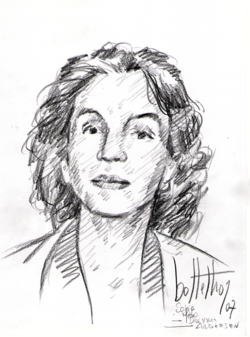Sophia de Mello Breyner Andresen

Sophia de Mello Breyner Andresen (born November 6, 1919 in Porto , † July 2, 2004 in Lisbon ) was one of the most important Portuguese authors . In 1999 she was the first Portuguese woman to receive the most important literary prize in the Portuguese-speaking world , the “ Prémio Camões ”.
Life
The great-granddaughter of a Danish immigrant, who calls herself a “storyteller”, studied at the University of Lisbon and in 1944 published her first volume of poetry, Poesia . Her best-known works include Dia do Mar (Sea Day), O nome das coisas (The Name of Things) and Ilhas (Islands) as well as the children's books A Menina do Mar (The Meermermaid), O Cavaleiro da Dinamarca (The Danish Knight), A. Floresta (The Forest) and O Rapaz de Bronze (The Bronze Boy). During the Salazar regime she was involved in the resistance against fascism and after the Carnation Revolution she was elected to the constituent city parliament of her home town as a member of the Partido Socialista . In 1964 Sophia de Mello Breyner Andresen was awarded the Grande Prémio da Sociedade Portuguesa de Escritores , which was followed by numerous national and international awards. a. In 1999 the highest literary award in Portugal, the Prémio Camões . Sophia de Mello Breyner Andresen was married to Francisco Sousa Tavares and had five children.
Your father has Danish roots. Her grandfather, Jan Henrik Andresen, went ashore in Porto one day and never left the region. His son João Henrique bought the "Quinta do Campo Alegre" in 1895, today the Botanical Garden of Porto. As he said in an interview in 1993, this quinta was “a marvelous piece of earth with a large and rich family, who were looked after by a large servants.” Sophia de was raised in the old Portuguese aristocracy and brought up according to these ethical and Christian values Mello Breyner one of the leading figures of the Catholic student movement when she studied classical philology in Lisbon. She became one of the most important liberal political figures and supported the monarchists against the Salazar regime and its supporters. This view remains in the peace song “Vemos, Lemos e Ouvimos. Não podemos ignorar! ”(“ We see, read and hear. We cannot ignore it! ”) Alive. In 1946 she married the journalist, politician and lawyer Francisco Sousa Tavares and had five children: a secular missionary, a university professor, a lawyer, a lawyer and renowned journalist ( Miguel Sousa Tavares ), a painter and another daughter who took the name inherited from her mother. Her children inspired her to write children's literature. In 1964 she received the Grande Prémio de Poesia of the Sociedade Portuguesa de Escritores (Association of Portuguese Writers) for her book “Livro sexto”. After April 25, 1974, she was elected to the Constituent Assembly through a list in the Socialist Party, while her husband tended towards the Social Democratic Party. Her stories (“Contos Exemplares”) differ from her children's books (A Menina do Mar, O Cavaleiro da Dinamarca, A Floresta, O Rapaz de Bronze, A Fada Oriana etc.). She became the translator of Dante Alighieri and Shakespeare and a member of the Academia das Ciências (Academy of Sciences) in Lisbon. In addition to the “Prémio Camões”, she was also awarded the “Prémio Rainha Sofia” in 2003. Sophia de Mello Breyner died in Lisbon in July 2004 at the age of 84.
Works
poetry
- Poesia (1944)
- O Dia do Mar (1947)
- Coral (1951)
- No Tempo Dividido (1954)
- Mar Novo (1958)
- Livro Sexto (1962)
- O Cristo Cigano (1962)
- Geografia (1967)
- Degree (1970)
- 11 Poemas (1971)
- Dual (1972)
- Antologia (1975)
- O Nome das Coisas (1977)
- Navegações (1983)
- Ilhas (1989)
- Musa (1994)
- Signo (1994)
- O Búzio de Cós (1997)
- Mar (2001)
- Primeiro Livro de Poesia (1999)
- Orpheu e Eurydice (2001)
fiction
- stories
- Contos Exemplares (1962)
- Histórias da Terra e do Mar (1984)
Children's stories
- A Menina do Mar (1958)
- A Fada Oriana (1958)
- Noite de Natal (1959)
- O Cavaleiro da Dinamarca (1964)
- O Rapaz de Bronze (1965)
- A Floresta (1968)
- Árvore (1985)
Plays
- O Bojador
- O Colar
Textbooks
- Cecília Meireles (1956)
- Poesia e Realidade (1960)
- O Nu na Antiguidade Classica (1975)
Translations
- A Anunciação de Maria (Paul Claudel)
- O Purgatório (Dante)
- Hamlet (William Shakespeare)
- Muito Barulho por Nada (William Shakespeare)
- Medeia (Eurípedes)
Prices
- 1964 - Grande Prémio de Poesia da Sociedade Portuguesa de Escritores, atribuído a Livro Sexto.
- 1977 - Prémio Teixeira de Pascoaes
- 1983 - Prémio da Crítica, the Associação Internacional de Críticos Literários
- 1989 - Prémio D. Dinis, the Fundação da Casa de Mateus
- 1990 - Grande Prémio de Poesia Inasset / Inapa
- 1992 - Grande Prémio Calouste Gulbenkian de Literatura para Crianças
- 1994 - Prémio 50 anos de Vida Literária, the Associação Portuguesa de Escritores
- 1995 - Prémio Petrarca
- 1996 - Homenageada do "Carrefour des Littératures"
- 1998 - Prémio da Fundação Luis Miguel Nava
- 1999 - Prémio Camões
- 2000 - Prémio Rosalia de Castro, of the Pen Clube Galego
- 2001 - Prémio Max Jacob Étranger
- 2003 - Prémio Rainha Sofia de Poesia Iberoamericana.
| personal data | |
|---|---|
| SURNAME | Andresen, Sophia de Mello Breyner |
| BRIEF DESCRIPTION | Portuguese author |
| DATE OF BIRTH | November 6, 1919 |
| PLACE OF BIRTH | postage |
| DATE OF DEATH | July 2, 2004 |
| Place of death | Lisbon |